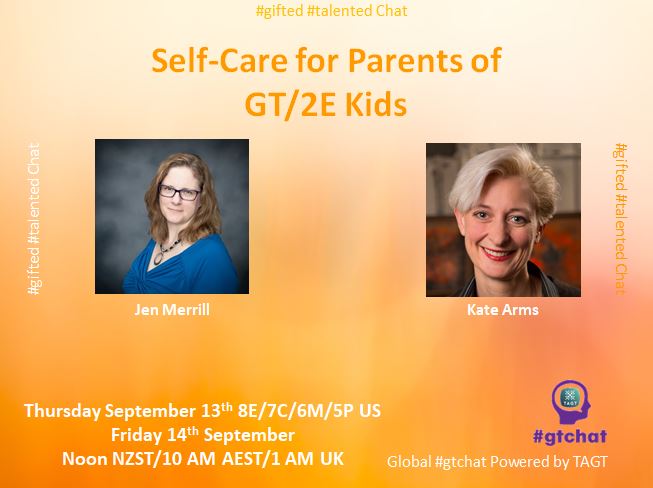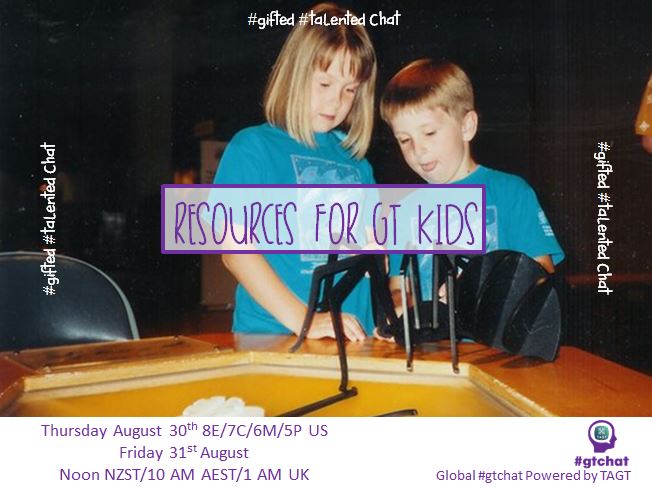
Understanding the nature of giftedness when complicated by distractibility is a complex issue and the discussions between participants at this week’s #gtchat were no exception. We were fortunate to have several psychologists well-versed in working with gifted individuals as well as education professionals to sort it out.
How do you know if distractibility is just a characteristic of giftedness or ADD/ADHD? You may not know! ADD/ADHD must be diagnosed by a professional. If you are concerned about a child’s behavior, seek professional help. Both giftedness and ADD/ADHD share characteristics, but it’s important to avoid misdiagnosis or missed diagnosis. Gifted students may have ADD/ADHD but be able to compensate for it.
According to Dr. Gail Post, “ADHD causes more global problem with distraction and concentration, not just related to boredom, intensities, overexcitabilities. ADHD kids have little control over their distraction/poor concentration – not situation specific. They really suffer from it.” Dr. Scott Roseman explained, “Formal assessment of giftedness and ADHD differ in significant ways. While assessment of giftedness focuses mainly on determination of higher level reasoning abilities, assessment of ADHD examines issues related to distractibility, impulsivity, and processing skills. While the gifted child may exhibit some of these qualities, as a function of their giftedness, it’s often when those qualities get in the way of learning & growth that further assessment should be considered to assess a dual diagnosis of Giftedness and ADHD.”
In response to a child’s distractibility, the response of ‘over’ organizing by a concerned adult may prove to make matters worse. Over organization … such as separate folders for each subject … may overwhelm the distracted child causing even more issues or anxiety. Parents (and teachers) should try to find the ‘middle ground’ when attempting to organize a distracted child. Folders can be used but for more generalized subjects; such as, a completed homework folder, to do folder, and parent/teacher communications.
“The main disadvantage of “over” organization I see is when it is put in place by the parent and not the child. The child or adolescent has no “ownership” in the process and may grow too reliant on parental intervention and not develop effective organizational tools on their own.” ~ Scott Roseman, Ph.D.
Executive Functioning can play as intricate role in the life of a distracted yet gifted child. The lack of recognition by responsible adults that a GT child can have executive function deficits often exacerbates the situation. These are smart kids who struggle with behavior regulation and exercising cognitive flexibility. Although identified as GT, they may have trouble beginning tasks, maintaining attention, completing assignments, and unable to assess the feedback on their own behavior. Frustration levels can go through the roof. As the child progresses through school, academic requirements increase at the same time as social interactions take on greater significance. EF difficulties may not resolve themselves until the child reaches their mid-twenties.
What strategies can a teacher use to get a gifted student back on track? Teachers should consider authentic assessments to chart progress/regression through an ongoing process which takes into account the student’s abilities as well as challenges. Developing positive relationships is a good 1st step. They must ensure that the student is being sufficiently stimulated intellectually either within the classroom with differentiated instruction or through accelerative measures outlined in resources such as A Nation Empowered.
“I think you have to do lots of trial and error with strategies…visual prompts to get back on task or having a reward after a significant start to an assignment or discussing what the feedback means.” ~ Heather Vaughn, EdS,
Once it is determined that the student is off track, any plan to bring them back on course must involve student input. Dr. Roseman suggested, “I suggest that the teacher start by asking the gifted student, in grade 3 and above to come up with their own plan to stay on task and then work together with them, examining the parts of the plan that work and the parts that don’t seem to work for them and revise. I believe that it helps the child to gain a better understanding of their own dynamics and figure out strategies that work for them and those that don’t. The teacher can certainly suggest some strategies, but it is critical for the student to have input.”
“With my kids, what has worked is a combination of doing it for them if was really necessary until they could do it; letting them fail a little when stakes are low, and coaching them about the things not being organized has negative impact on.” ~ Kate Arms
Parents can help their highly distracted child get organized at home, too. They can make sure that the home environment limits distractions when their child is doing school work. This includes having a quiet workspace free from access to video games or television. If possible, provide study/work space solely for each child; not in a highly active part of the home such as the dining room table or shared spaces with siblings. Parents need to model behavior which provides examples of how to stay organized in daily life.
“Pick your battles… But get them involved in devising a plan and incentives, prioritize, small goals to start with, make it fun!” ~ Gail Post, Ph.D.
Organization is a must-need skill and one that parents focus on much to the dismay of their distracted child. Involve the child in the organizing process. Be flexible; not all organizing tools or tips work for every child. Parents and teachers working together to implement strategies that take place at home and at school can be highly beneficial to the student in an effort to reduce distractions and get the student back on track. For more tips about organizing the highly distracted gifted child, check out the transcript of this week’s chat at Wakelet.

Global #gtchat Powered by the Texas Association for the Gifted and Talented is a weekly chat on Twitter. Join us Thursdays at 8E/7C/6M/5P in the U.S. and Fridays at Noon NZST/10 AM AEST/1 AM UK to discuss current topics in the gifted community and meet experts in the field. Transcripts of our weekly chats can be found at Wakelet. Our Facebook Page provides information on the chat and news and information regarding the gifted community. Also, checkout our Pinterest Page and Playlist on YouTube.
 About the author: Lisa Conrad is the Moderator of Global #gtchat Powered by TAGT and Social Media Manager of the Global #gtchat Community. She is a longtime advocate for gifted children and also blogs at Gifted Parenting Support. Lisa can be contacted at: gtchatmod@gmail.com
About the author: Lisa Conrad is the Moderator of Global #gtchat Powered by TAGT and Social Media Manager of the Global #gtchat Community. She is a longtime advocate for gifted children and also blogs at Gifted Parenting Support. Lisa can be contacted at: gtchatmod@gmail.com
Resources:
The Highly Distracted Gifted Child: You Can Help
Gifted Students & Disorganization (Reg. required)
This Child is a Classic ‘Absent-Minded Professor’
How to Raise a Gifted Child without Losing Your Ever-Loving Mind
Executive Functioning in Gifted Students (pdf)
4 Smartphone Solutions to Keep Your Teen Organized
7 Ways to Teach Your Grade-Schooler Organization Skills
Exercise Is Surprisingly Effective At Boosting Executive Function
On Rainbows and Mantis Shrimp: A Layperson’s Perspective on ADHD & the Misdiagnosis of Gifted Brains
How to Help the Impulsive Disorganized Child
Organizing Einstein: Enhancing the Abilities of the Gifted Learner Part 1
Becoming a Self-Regulated Learner: An Overview (pdf)
Cybraryman’s Study Skills/Organization Page
Sprite’s Site: Sprite on the Subject of Homework
Interruptions at Work Are Killing Your Productivity
Tips for Parents: Executive Functioning at Home and School
Image courtesy of Pixabay CC0 Creative Commons
Graphic courtesy of Lisa Conrad

